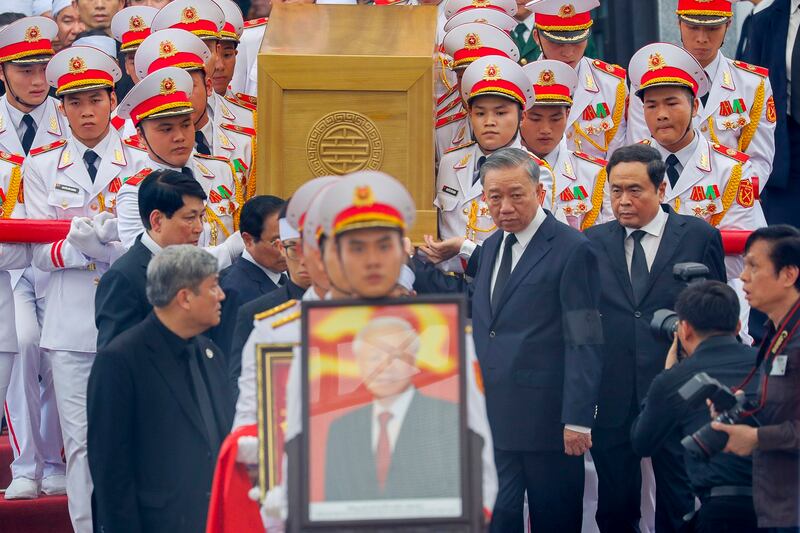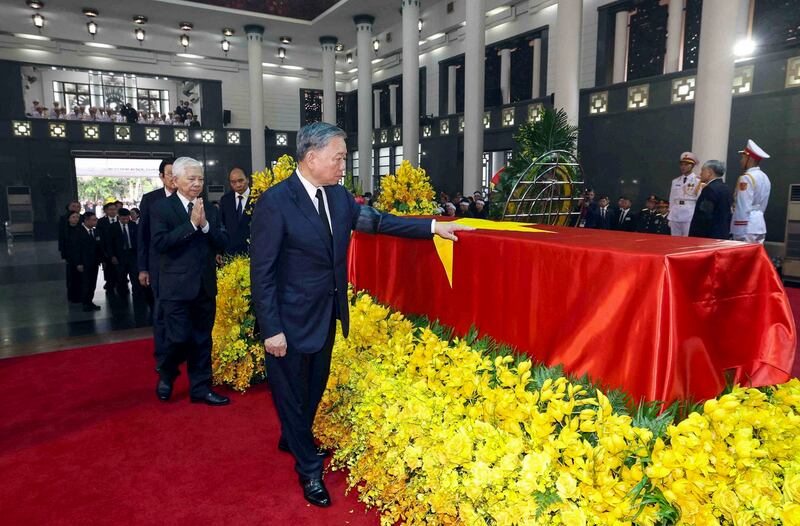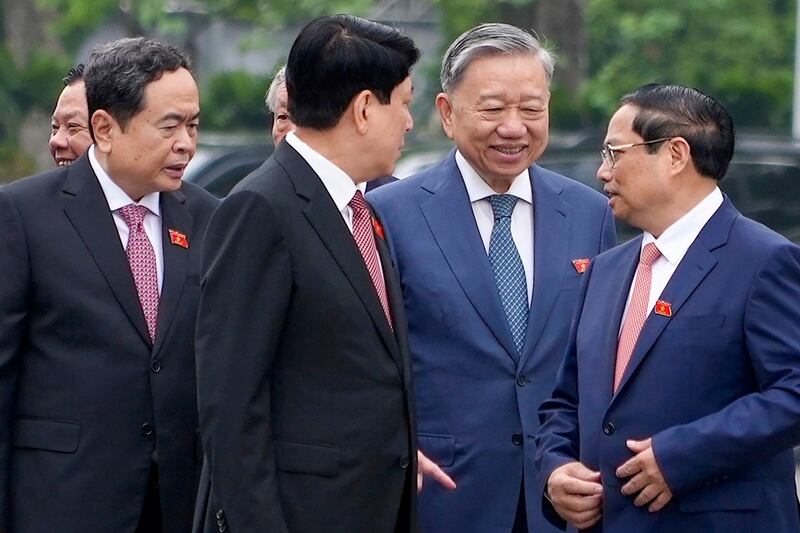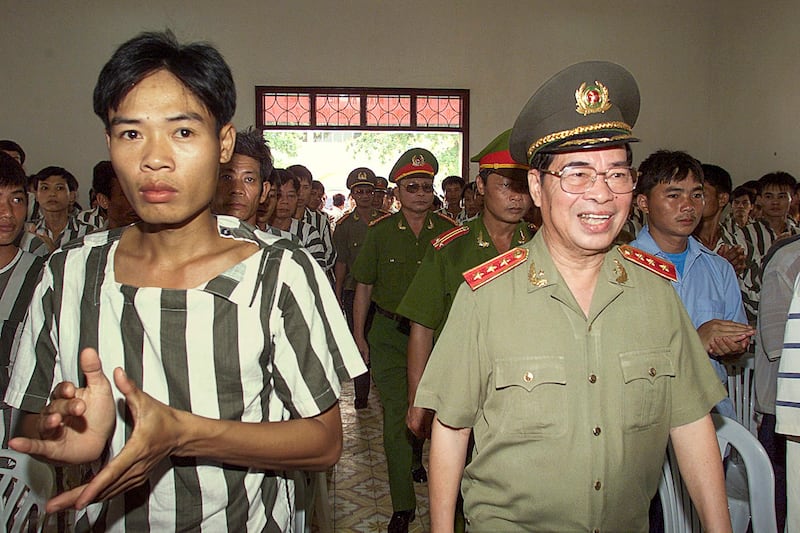Following the solemn multi-day funeral of Communist Party of Vietnam General Secretary Nguyen Phu Trong, who passed away on July 19 after a long period of declining health, the dust is starting to settle and there’s more understanding of what will follow.
The funeral was as dignified, humble, and understated as the man himself. There was an outpouring of grief from the party and state leadership.
Vietnamese were inordinately proud of the international showing at the funeral as a symbol of respect for the country. Vietnamese noted Trong’s simplicity, embodied by his plain wooden coffin.

His family were seen by most Vietnamese for the first time. In stark contrast to the family members of the rest of Vietnam’s political leadership, Trong’s family have always lived simple lives, never cashing in on the leader’s status to enrich themselves – a practice that now seems to be a birthright of the children of many of Hanoi’s political elite.
Vietnam watchers combed through the funeral footage looking for clues. Who was there and in what order? Who were the pallbearers? Who was not there? Which purged officials bothered to show up? What did they write in the condolence book, and did it have any secret meaning?
Behind the mourning, the political jockeying was already underway.
The day before Trong’s passing, the Politburo bypassed the head of the Communist Party Secretariat, Luong Cuong, and announced that To Lam would assume Trong’s responsibilities.
Lam headed the party’s funeral committee and the mourning procession. That may be symbolic, but symbolism matters.
Key deputy appointments
Even before the funeral, Lam was working to strengthen his position. He quickly maneuvered to place two of his deputies from the Ministry of Public Security in critically important positions.
Luong Tam Quang became his successor as the Minister of Public Security. Quang is not just from Lam’s home province of Hung Yen, but is deeply tied to Lam through family: Quang’s father served as Lam’s father’s personal body guard in the south during the war against the Americans.
The second deputy, Nguyen Duy Ngoc, who also hails from Hung Yen province, is now the head of the Central Committee Office, which is critically important in terms of organizing meetings and agenda setting. He will play an important role in the personnel selection for the 14th Party Congress.
Le Minh Hung, the former governor of the State Bank of Vietnam, was appointed to head the Central Committee’s organization department at the 9th Plenum when he was elevated to the Politburo. This ostensibly puts him in charge of all party personnel ahead of the 14th Congress in January 2026.

Despite his economic pedigree, Hung is tied to Lam in a particular way. Hung’s father, Le Minh Huong was the former Minister of Public Security, who steered Lam’s career.
On Aug 3, the Central Committee unanimously elected President Lam as acting general secretary.
Despite speculation that Gen. Luong Cuong would assume the presidency and return Vietnam to a collective leadership, Lam will concurrently serve as both general secretary and the president.
Trong’s anti-corruption Blazing Furnace campaign is ongoing, and for the same reason: the consolidation of political power.
"The work on anti-corruption will be continued fiercely,” Lam said at his news conference following the Central Committee meeting.
It will be "relentless, restless, without exceptions, no matter who the person is,” he said.
And with a hint of menace, Lam continued: "Personally, I feel fortunate that I have much experience in handling the anti-corruption campaign during the time I worked at the police ministry."
Still ablaze
Immediately Lam got to work. In the afternoon session, four members of the Central Committee, already under investigation, were allowed to resign for violating party discipline.
The departure of two of the four must be seen as a means to further consolidate his power.
While many still see Prime Minister Pham Minh Chinh as an effective check on Lam’s ambitions, Chinh is vulnerable.
One of his three deputy prime ministers, Le Minh Hai, was forced off the Central Committee, while a second, Tran Hong Ha, is still under investigation.
The third criminal corruption trial is underway for Advanced International Joint Stock Company – known as AIC – in Vietnam. AIC’s fugitive chairwoman, Nguyen Thi Thanh Nhan, was convicted twice in absentia and sentenced to 30- and 10-year jail terms, respectively. She has been tied to Chinh, both professionally and personally.

Perhaps more importantly, the Quang Ninh province’s party secretary, Nguyen Xuan Ky, who has been under investigation, was also removed from the Central Committee.
While there is not necessarily a direct tie to Chinh, the prime minister was Quang Ninh’s party chief from 2011 to 2015. The feared Vietnamese Ministry of Public Security digging through the provincial books should give Chinh pause.
Lam assigned the Quang Ninh police posting to an ally, Maj. Gen. Dinh Van Phuong, in August 2022, with the implicit task of digging up dirt on Chinh.
It is rare that someone so senior would be assigned as a provincial police chief.
There are reports that Phuong is being rewarded for his service with a promotion back to headquarters in Hanoi as the head of the ministry’s internal political security department. This office is in charge of regime security, and only goes to the most trusted party stalwarts.
Take a moment to read more
[ Vietnamese Communist chief Nguyen Phu Trong leaves behind a weak, fractious partyOpens in new window ]
[ Nguyen Phu Trong left Vietnam's Communist Party ripe for strongman ruleOpens in new window ]
[ Meet To Lam, Vietnam's Communist Party chief and successor to Nguyen Phu Trong Opens in new window ]
[ Vietnam’s Communist Party might not attain the normalcy it seeks after reshuffleOpens in new window ]
Keeping rivals in check
Investigating corruption requires people you can trust, and who could be more trustworthy than your own son? Lam's only son, Col.l To Long, just received a promotion and will serve as the minister of public security for Hai Duong province.
After several years of overseas study, the younger Lam joined the ministry and quickly rose through the ranks of the external security branch, where he worked on the country’s UN peacekeeping missions.
Hai Duong is an interesting choice for the Lam’s son. It is a small province of some 2.4 million people located in the Red River Delta between Hanoi and Haiphong.
It’s a sprawl of industrial estates, so for someone with little experience in policing but a familial interest in keeping tabs on the country’s businessmen, it’s a great place to dig around.
While Lam is only the acting general secretary, he’s now on a glide path to be elected at the 14th Congress in January 2026.

In many ways, Trong’s death has created a bit more political stability in the country. If the goal of the anti-corruption investigations into senior leaders was to clear a path for Lam to succeed him, then mission accomplished.
One last thing to look for is whether and when Minister of Public Security Luong Tam Quang will be elevated to the now 14-member Politburo. Historically the security minister is always on the Politburo, and Lam would love to have another ally there.
Regardless, as both president and acting general secretary, Lam is in an incredibly powerful position going into the 14th Party Congress. He has key allies in the Central Committee Office and the Organization Commission to help shape the leadership selection over the next 18 months. And Lam continues to wield the investigative powers of the Ministry of Public Security to check any ambitious rivals.
Zachary Abuza is a professor at the National War College in Washington and an adjunct at Georgetown University. The views expressed here are his own and do not reflect the position of the U.S. Department of Defense, the National War College, Georgetown University or Radio Free Asia.

